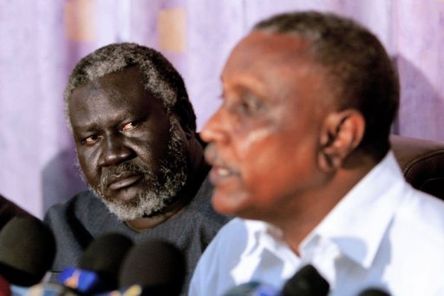
Amid cross-border attacks by the government of Sudan on South Sudan, and the recent takeover of the former rebel stronghold Kurmuk in Sudan’s Blue Nile state, major Sudanese rebel groups have officially joined forces in an alliance to topple the Khartoum regime.
Rebel groups from the Darfur region to the east formed the Sudan Revolutionary Front, or SRF, with the aim to overthrow Bashir’s National Congress Party, or NCP, through the “convergence of civil political action and armed struggle.” The alliance includes the Sudan People’s Liberation Movement-North, or SPLM-N; Justice and Equality Movement, or JEM; Sudan Liberation Army-Abdul Wahid, or SLA-AW; Sudan Liberation Army-Minni Minnawi, or SLA-MM; and the Beja Congress.
Although the uniting of Sudanese rebel groups is not unique to the SRF and has been suggested for several weeks, this marks the first time that the SPLM-N has been willing to work both politically and militarily side-by-side with the Darfur rebels. Also with the November 15 addition of the Sudanese armed opposition group Beja Congress of eastern Sudan, the SRF has quickly become a broad alliance uniting together various groups of Sudanese society into one movement.
“The SRF has been a long time coming,” said Enough policy advisor Omer Ismail. “The government of Sudan thrives on the divisions between the groups. Now with the talk of change in Sudan becoming more obvious and the demographic for change growing among the peoples of Sudan, what is left to be anticipated is how that change would come about, and now there are some answers.”
Secretary-General of the SPLM-N Yasir Arman said the SRF will soon hold a conference with 44 participating members in attendance to discuss how to bring about regime change. “All these members are being contacted and we are also talking to the political forces to expand the alliance,” he said. SRF is trying to build up institutions and supporters in cities and villages across Sudan.
SRF’s publicly announced aim to oust the ruling political party, with arms if necessary, has raised concerns within the United Nations. On November 15 during a Security Council briefing on Sudan, U.N. Under Secretary-General for Peacekeeping Operations Hervé Ladsous warned that the SRF could be counterproductive and spark further violence. He emphasized the need for all parties to the different Sudan conflicts to return to the negotiating table.
“There is no military solution to the Sudan conflicts,” Ladsous said. “All military actions only endanger the lives of innocent civilians, who deserve a return to peace and stability after so many years of fighting.”
While Ladsous’s words may hold some truth to them, Sudanese opposition parties contend that they have been backed into a corner by the Sudanese government with regime change through military might as a last option. “The government forced the movements to choose military means,” Siddiq Yusuf, a member of the central committee of the Sudanese Communist Party and a leader of the National Consensus Forces, an umbrella group of Sudan's main opposition parties, told Radio Dabanga. “Whether my party consents it or not, every party has the right to make such a decision.”
Other Sudanese opposition parties welcomed the new alliance, mainly because of its goal to overthrow Bashir. Kamal Omar Abdel Salam, political secretary of Popular Congress Party, which is known across Sudan for its non-violence platform, said that although his party supports a more democratic approach to regime change, the SRF gives hope to the people of Sudan.
Yasir Arman, secretary-general of the SPLM-N and now member of the SRF, voiced the alliance’s concerns in response to the U.N.’s adverse position on the SRF:
Instead of supporting the victims and the right of the Sudanese people to democracy and the respect for human rights and the rule of law, it is supporting the aggressors and war criminals. On top of them is Bashir who is wanted by the ICC.
Arman’s response raises an important question: What has the U.N. done in response to the recent attacks by the Sudanese government in Blue Nile and South Kordofan?
Opposition leaders say it is time that the people of Sudan unite together to ensure that their rights are upheld. At the moment the SRF fills that role and has the potential to be a game changer in the state of Sudan. However, the alliance faces several major challenges moving forward, perhaps the biggest being whether the SRF can prove to the world that it is a viable alternative to the Bashir regime, and that it has the sophistication to articulate a vision for the entire country, not just the periphery.
As the Khartoum regime clings to power, the level of stability of the Sudanese political system is an open question. With the separation of the South and in the wake of the Arab Spring, people of Sudan are now realizing that change is possible. However, the threat of a long and drawn-out conflict that would likely ensue if moves were made to topple Bashir and the NCP looms large.
“The SRF is giving hope to the people of Sudan that the NCP can be challenged,” said Omer Ismail. He explained that this belief has its roots in the May 2008 attack on Khartoum led by JEM leader Khalil Ibrahim, which was the first time the NCP faced a potentially existential challenge.
This time around, Khalil’s party is joined by others within the SRF, but they are still using the same slogan: Kul Alguwa… Khartoum Jowa, which translates to “All Force Inside Khartoum.”
Photo: SPLM-N Secretary General Yasir Arman and SPLA-N commander Malik Agar (Reuters)

